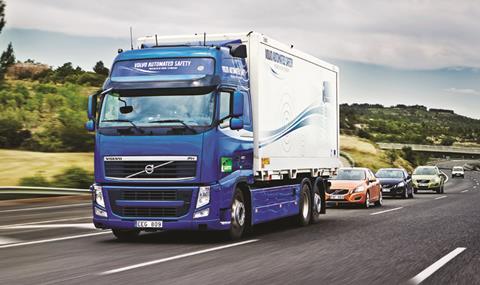
Governments must prepare plans to manage the effect of millions of redundancies created by the rise of driverless trucks, experts have warned.
Automated trucks could slash the demand for drivers by up to 70% in the US and Europe by 2030, according to a report from the International Transport Forum (ITF).
The report predicts that up to 4.4 million of 6.4 million trucking jobs could become redundant across the US and Europe, which may result in social disruption unless governments manage the transition to driverless trucks.
The report, Managing the transition to driverless road freight transport, recommends the creation of a transition advisory board to advise on labour issues, the adoption of a temporary permit system to manage the speed of adoption and the creation of a set international standards, road rules and vehicle regulations for self-driving trucks.
It also recommends the continuation of pilot projects with driverless trucks to test vehicles, network technology and communications protocols.
José Viegas, secretary-general of the International Transport Forum (ITF) said: “Manufacturers are investing heavily in automation and many governments are actively reviewing their regulations.
"Preparing for the potential negative social impact of job losses will mitigate the risks in case a rapid transition occurs.”
Christian Labrot, president of the International Road Transport Union (IRU), said: “Autonomous trucks will bring many benefits to society, from cost savings and lower emissions to safer roads. Autonomous vehicles will help the haulage sector deal with the current shortage of drivers in many parts of the world.
"However we have to remember the dedicated drivers of today will need to be retrained tomorrow, and we must keep attracting professionals into road transport. We all need to work together for a smooth transition to driverless technology.”
Steve Cotton, general secretary of the International Transport Workers’ Federation said automation in trucking needs a managed and just transition.
“We must avoid excessive hardship for truck drivers and ensure the gains from the technology are fairly shared across society. Self-driving trucks threaten to disrupt the careers and lives of millions of professional truck drivers.
"This report is a timely investigation into how that transition could happen. Its recommendations will help governments to ensure a just transition for affected drivers,” he said.
It came after a panel of manufacturers told those attending Motor Transport's Truck to the Future debate at the Microlise Transport Conference that legal liabilities and lack of collaboration between operators were among the major issues that continue to hold back the mainstream adoption of automated HGV technology and platooning in the UK.













